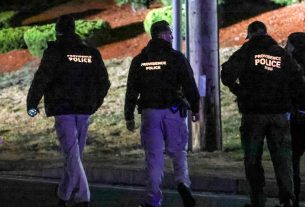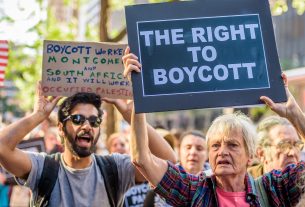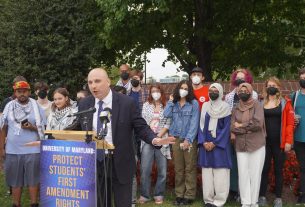((JEWISH REVIEW)) — President Joe Biden secured an agreement from Israel to allow the transfer of humanitarian assistance into the Gaza Strip during his visit to Israel on Wednesday, and said the United States would provide $100 million in humanitarian to the Palestinians.
“Based on the understanding that there will be inspections that the aid will go to civilians not to Hamas, Israel agreed humanitarian assistance can begin to move from Egypt to Gaza,” Biden said. Prime Minister Benjamin Netanyahu later confirmed the agreement.
Coming away from the trip with tangible progress toward relief for Palestinians in Gaza was a critical takeaway for Biden. The president hopes to sustain international support for Israel as it strikes back at Hamas after the terrorist group’s deadly invasion of Israel on Oct. 7, in which terrorists killed 1,400, wounded thousands and took 200 people captive. Israel’s airstrikes in Gaza have since killed more than 3,200 people.
Biden’s trip was complicated by a blast at a hospital in Gaza City yesterday that Hamas said killed hundreds. Israel has said the explosion was caused by a rocket that was misfired by a terrorist group inside the Gaza Strip — an assessment the Pentagon and Biden have backed up after viewing intelligence. Hamas and the Palestinian Authority blamed the explosion on an Israeli airstrike.
Arab capitals erupted in protests after the hospital was hit, and the leaders of Egypt, Jordan and the Palestinian Authority pulled out of a summit Biden had called for in Amman, Jordan, that was focused on getting humanitarian assistance to civilians in Gaza.
He nonetheless appeared to come away with a deal. Israel confirmed that it would not object to the assistance if it was delivered across the Egypt-Gaza border, rather than via Israel.
“In light of President Biden’s request, Israel will not prevent humanitarian assistance from Egypt as long as it is only food, water and medicine for the civilian population located in the southern Gaza Strip or which is evacuating to there, and as long as these supplies do not reach Hamas,” Netanyahu’s office said in a statement. “Any supplies that reach Hamas will be prevented.”
What “prevented” means was not clear, as Israel does not control the Gaza-Egypt border. But Israel has in the past conducted airstrikes against weapons transfers to terrorist groups.
In a social media post after his speech, Biden said the U.S. assistance would not reach Hamas. “This money will support over 1 million displaced and conflict-affected Palestinians,” said the post on X, formerly known as Twitter. “And we will have mechanisms in place so this aid reaches those in need – not Hamas or terrorist groups.”
Biden emphasized in his speech, as he has since Hamas invaded Israel, that Israel must observe the rules of war and must distinguish Hamas terrorists from Palestinian civilians. Israeli is on the verge of a potential large-scale ground invasion of Gaza.
“The vast majority of Palestinians are not Hamas,” Biden said.
“Like the United States, you don’t live by the rules of terrorists, you live by the rule of law,” he said. “What sets us apart from a terrorist? Because we believe in the fundamental dignity of every human life, Israeli, Palestinian, Arab, Jew, Muslim, Christian, everyone. You can’t give up on what makes you who you are. If you give that up, the terrorists win, and we can never let them win.”
Biden — who also met with a group of Israelis who have become local heroes for rescuing people on Oct. 7 — began his speech with a vivid description of the stages of grief now assailing the loved ones of the 1,400 Israelis who were killed in the Hamas invasion. He referenced Jewish customs of mourning in the address.
“It’s like there’s a black hole in the middle of your chest,” he said. “You feel like you’ve been sucked into it. The survivor’s remorse, the anger, the questions of faith and your soul. Starting with staring at an empty chair, sitting Shiva. The first Sabbath without them. There are the everyday things, the small things you miss the most. the scent when you open the closet door. The morning coffee you share together. The bend of a smile, the perfect pitch of a laugh.”
As he did when he first arrived in Israel in the morning, he said Israelis should not feel abandoned. “You are not alone,” he said. “The United States stands with you.” He repeated his warning to any adversary of Israel plotting to exploit its vulnerability at a time of war, noting that he had moved U.S. troops into the region. “Don’t. Don’t. Don’t,” he said.
He finished his speech by apologizing for not being able to pronounce a phrase in Hebrew that he favors.
“I’m such a terrible linguist,” he said. “I’ll say it in English. The people of Israel live. The people of Israel live.”




